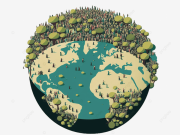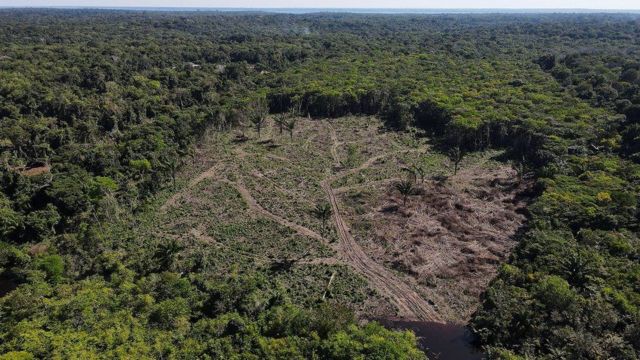Welcome to our blog, where we delve into the critical issue of deforestation and its far-reaching consequences on our planet. Join us as we explore the causes and drivers of deforestation, examine the environmental, social, and economic impacts, and discuss the urgent need for conservation efforts to preserve our forests for future generations.
Understanding Deforestation:
1.1 Defining Deforestation:
Exploring the concept of deforestation and its significance as the permanent removal of forests or tree cover from land.
Discussing the different forms of deforestation, including clear-cutting, selective logging, and land conversion for agriculture or infrastructure development.
1.2 Causes and Drivers:
Examining the underlying causes and drivers of deforestation, such as agricultural expansion, logging, urbanization, and infrastructure development.
Discussing the economic, political, and social factors that contribute to deforestation on a global scale.
1.3 Deforestation Hotspots:
Highlighting regions and countries that are particularly affected by deforestation, such as the Amazon rainforest, Borneo, the Congo Basin, and Southeast Asia.
Discussing the unique challenges and environmental significance of these deforestation hotspots.
Environmental Impacts of Deforestation:
2.1 Loss of Biodiversity:
Exploring the devastating impact of deforestation on biodiversity, including the loss of plant and animal species, and the disruption of ecosystems.
Discussing the importance of forests as habitats for countless species and the potential for the extinction of unique flora and fauna.
2.2 Climate Change:
Addressing the role of deforestation in climate change, specifically its contribution to greenhouse gas emissions and global warming.
Discussing the carbon storage capacity of forests and the importance of preserving them as a natural solution to mitigate climate change.
2.3 Soil Degradation and Erosion:
Highlighting the negative consequences of deforestation on soil quality and stability, including erosion, reduced fertility, and increased vulnerability to droughts and floods.
Discussing the long-term impacts on agriculture, food security, and local livelihoods.
Social and Economic Impacts of Deforestation:
3.1 Displacement of Indigenous Peoples and Local Communities:
Examining the social consequences of deforestation, particularly the displacement of indigenous peoples and local communities who rely on forests for their livelihoods and cultural identity.
Discussing the importance of recognizing and respecting the rights of these communities in conservation efforts.
3.2 Loss of Livelihoods:
Addressing the economic impacts of deforestation, including the loss of livelihoods for forest-dependent communities and the disruption of sustainable industries such as forestry and ecotourism.
Discussing alternative economic opportunities that promote forest conservation and sustainable development.
3.3 Water Cycle Disruption:
Exploring the role of forests in regulating the water cycle, including their contribution to rainfall patterns, water filtration, and the maintenance of river systems.
Discussing the potential consequences of deforestation on water resources, including droughts, floods, and water scarcity.
Conservation and Sustainable Forest Management:
4.1 Reforestation and Afforestation:
Highlighting the importance of reforestation and afforestation initiatives to restore degraded lands and establish new forests.
Discussing the benefits of these efforts in terms of carbon sequestration, biodiversity conservation, and sustainable land use.
4.2 Forest Certification and Responsible Logging:
Addressing the need for responsible logging practices and forest certification schemes to ensure sustainable management of forests.
Discussing the role of international initiatives such as the Forest Stewardship Council (FSC) in promoting responsible forestry practices.
4.3 Indigenous and Community-Led Conservation:
Recognizing the vital role of indigenous peoples and local communities in forest conservation efforts.
Discussing the importance of involving these communities in decision-making processes and recognizing their traditional knowledge and sustainable practices.
Policy and International Cooperation:
5.1 Strengthening Legal Frameworks:
Advocating for stronger national and international laws and policies to protect forests and combat deforestation.
Discussing the importance of enforcement mechanisms and penalties for illegal logging and land conversion.
5.2 International Cooperation and Financial Incentives:
Highlighting the significance of international cooperation and financial incentives to support forest conservation efforts in developing countries.
Discussing initiatives such as REDD+ (Reducing Emissions from Deforestation and Forest Degradation) and the importance of addressing drivers of deforestation, including commodity-driven supply chains.
Conclusion:
As we conclude our exploration of deforestation, we recognize the urgent need for immediate action to protect and restore our forests. By addressing the causes and drivers of deforestation, implementing sustainable land use practices, and engaging in international cooperation, we can preserve the invaluable environmental, social, and economic benefits that forests provide. Join us in future blog posts as we continue to address critical environmental issues and work towards a more sustainable and harmonious relationship with our planet’s forests.





















